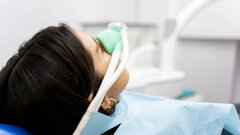SHARNBROOK, UK/LEIDEN, Netherlands: A new study on lifestyle and appearance has linked personal effort in oral hygiene to perception of facial age. The findings suggest that people with good dental routines and overall oral health can appear up to ten years younger.
A team of scientists at Unilever and Leiden University in the Netherlands evaluated various lifestyle factors, such as smoking, sun-bathing and oral care, in relation to perceived facial age. The results showed that, along with other factors, thorough oral care, including flossing and regular brushing routines, can have long-term effects on the preservation of a youthful look.
In order to determine perceived facial age, the researchers photographed about 800 people with their mouths closed. The portraits were then shown to 60 assessors, who estimated the age of each individual within a range of 5 years. The average perceived age of each person was then compared with the lifestyle factors collected via questionnaires. The study group included smokers and non-smokers from the Netherlands and England aged 45 to 75.
The researchers found that Dutch women with few remaining teeth were associated with a total perceived facial age of 10.9 years higher than their actual age. In comparison, Dutch men with dentures who did not floss were significantly associated with a total perceived facial age of 9.3 years higher. Similar findings were made in the British group, as English women who cleaned their teeth only once a day and wore dentures had a total perceived facial age of 9.1 years higher than women with natural teeth and a comprehensive oral routine.
“The number of teeth and the condition of the surrounding gums are known to directly influence the appearance of overlying tissues. For example, people look younger with their mouths closed after receiving new dentures, and the number of teeth or the use of dentures has been linked to lip size and the appearance of the labio-mental fold,” stated Dr David Gunn, a senior scientist at Unilever.
The authors stressed that oral care aspects could possibly have been proxies of other lifestyle factors, such as diet. However, dental aspects were significantly associated with perceived facial age in the groups studied.
The study, titled “Lifestyle and youthful looks”, was published online on 27 January in the British Journal of Dermatology ahead of print.
LONDON, UK: The deadline for UK-based dental care professionals (DCPs) to make their annual or end-of-cycle continuing professional development (CPD) ...
Advances in technology in dentistry have rapidly improved diagnostics, streamlined treatments and made the dental chair a safer, more comfortable place. ...
LEEDS, England: Improving oral healthcare for patients who have completed treatment for head and neck cancer remains a persistent challenge in the UK. Many ...
DUBLIN, Ireland: Sustainability is now widely recognised as a core responsibility in dentistry, although translating this into measurable action remains ...
LONDON, UK: “An era of high, perhaps inflated valuations may be coming to an end,” the National Association of Specialist Dental Accountants and Lawyers...
LONDON, UK: The ongoing Brexit negotiations have created a fair amount of uncertainty for dental professionals based in the UK, with there being a distinct ...
The recent news that 22,000 patients of a Nottinghamshire dentist are being contacted and offered testing for blood-borne diseases, such as HIV and ...
DUBLIN, Republic of Ireland/ BRISTOL, UK: Oasis Healthcare, one of the largest providers of private dental care services in the UK, has further strengthened...
BARKING, England: Queen Mary University of London, in partnership with the London Borough of Barking and Dagenham Council, has announced the opening of a ...
LEIPZIG, Germany: It is hard to overstate the impact that the COVID-19 pandemic has had on dental trade fairs in 2020. From March onwards, essentially all ...
Live webinar
Tue. 24 February 2026
6:00 pm UTC (London)
Prof. Dr. Markus B. Hürzeler
Live webinar
Tue. 24 February 2026
8:00 pm UTC (London)
Prof. Dr. Marcel A. Wainwright DDS, PhD
Live webinar
Wed. 25 February 2026
4:00 pm UTC (London)
Prof. Dr. Daniel Edelhoff
Live webinar
Wed. 25 February 2026
6:00 pm UTC (London)
Live webinar
Thu. 26 February 2026
1:00 am UTC (London)
Live webinar
Tue. 3 March 2026
4:00 pm UTC (London)
Dr. Omar Lugo Cirujano Maxilofacial
Live webinar
Wed. 4 March 2026
1:00 am UTC (London)
Dr. Vasiliki Maseli DDS, MS, EdM



 Austria / Österreich
Austria / Österreich
 Bosnia and Herzegovina / Босна и Херцеговина
Bosnia and Herzegovina / Босна и Херцеговина
 Bulgaria / България
Bulgaria / България
 Croatia / Hrvatska
Croatia / Hrvatska
 Czech Republic & Slovakia / Česká republika & Slovensko
Czech Republic & Slovakia / Česká republika & Slovensko
 France / France
France / France
 Germany / Deutschland
Germany / Deutschland
 Greece / ΕΛΛΑΔΑ
Greece / ΕΛΛΑΔΑ
 Hungary / Hungary
Hungary / Hungary
 Italy / Italia
Italy / Italia
 Netherlands / Nederland
Netherlands / Nederland
 Nordic / Nordic
Nordic / Nordic
 Poland / Polska
Poland / Polska
 Portugal / Portugal
Portugal / Portugal
 Romania & Moldova / România & Moldova
Romania & Moldova / România & Moldova
 Slovenia / Slovenija
Slovenia / Slovenija
 Serbia & Montenegro / Србија и Црна Гора
Serbia & Montenegro / Србија и Црна Гора
 Spain / España
Spain / España
 Switzerland / Schweiz
Switzerland / Schweiz
 Turkey / Türkiye
Turkey / Türkiye
 UK & Ireland / UK & Ireland
UK & Ireland / UK & Ireland
 International / International
International / International
 Brazil / Brasil
Brazil / Brasil
 Canada / Canada
Canada / Canada
 Latin America / Latinoamérica
Latin America / Latinoamérica
 USA / USA
USA / USA
 China / 中国
China / 中国
 India / भारत गणराज्य
India / भारत गणराज्य
 Pakistan / Pākistān
Pakistan / Pākistān
 Vietnam / Việt Nam
Vietnam / Việt Nam
 ASEAN / ASEAN
ASEAN / ASEAN
 Israel / מְדִינַת יִשְׂרָאֵל
Israel / מְדִינַת יִשְׂרָאֵל
 Algeria, Morocco & Tunisia / الجزائر والمغرب وتونس
Algeria, Morocco & Tunisia / الجزائر والمغرب وتونس
 Middle East / Middle East
Middle East / Middle East

















































To post a reply please login or register